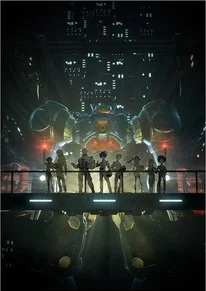Synopsis:
Yamato Ichidaiji’s ordinary life takes a dramatic turn when he discovers a shocking truth: the city he lives in is artificial, 99% of humanity has been wiped out, and he must pilot a giant robot to combat the aliens responsible. As Yamato and other teenagers are recruited to fight, they uncover a deeper, complex narrative involving Earth’s tumultuous history of technological advancements and ideological conflicts. Their mission becomes not just about survival but questioning the worth and impact of their fight.

Review:
The notion that mecha anime is a “dead genre” is often mistaken. While it may not dominate mainstream discussions, mecha anime continues to thrive with new entries that sometimes go unnoticed. Megaton Musashi, produced by Level-5 and OLM, is a recent example that faced delays in Western simulcasting, with its first season only recently becoming available on Crunchyroll and its second season released without much fanfare. The series, which ties in with a video game franchise that had limited English release, may not have been widely discussed but offers a fresh take on the genre.
Fans of mecha might initially view Megaton Musashi as a straightforward action series featuring teenagers piloting robots. The show, which shares guest-star space with iconic mecha like Mazinger Z, Getter Robo, and Voltes V, seems poised for straightforward action but quickly reveals deeper ambitions. Writer/director Akihiro Hino, known for his work on the controversial Gundam AGE, brings a complex narrative to this series, packing it with numerous plot twists and elements.
The first season of Megaton Musashi is dense with storylines involving an artificial city, shape-shifting invaders, androids, and psychic abilities. Each episode introduces new twists, sometimes akin to the rapid-fire humor of Airplane!, such as unexpected reveals and character transformations. While this approach can be entertaining, the sheer volume of twists sometimes overshadows character development. For instance, key characters like Asuna, though central to the plot, can be sidelined for extended periods, and some plot twists lack impact due to insufficient build-up.
As the season progresses, the narrative becomes increasingly convoluted, and the dark themes introduced can seem inconsistent with the show’s overall tone. The series grapples with mature themes but often reduces them to simpler messages about the consequences of war, focusing more on dramatic moments than nuanced exploration.
The mecha battles, while not poorly executed, lack the consistent excitement that might have driven the series. The battles are primarily CGI, which allows for smooth animation, but the disconnect between the pilots and their robots, along with limited environmental interaction, can detract from the overall impact. The action sequences sometimes feel routine and fail to build the sustained excitement needed to engage viewers fully.
Ultimately, Megaton Musashi is an ambitious series with a complex narrative and a mix of intriguing elements. However, its approach to storytelling and action can be uneven, prioritizing quantity of content over depth. It remains an interesting watch and could be worth checking out if you’re curious about its evolving story. Despite its potential, it does not yet mark a significant resurgence for the mecha genre but rather serves as an intriguing addition to its ongoing evolution.
